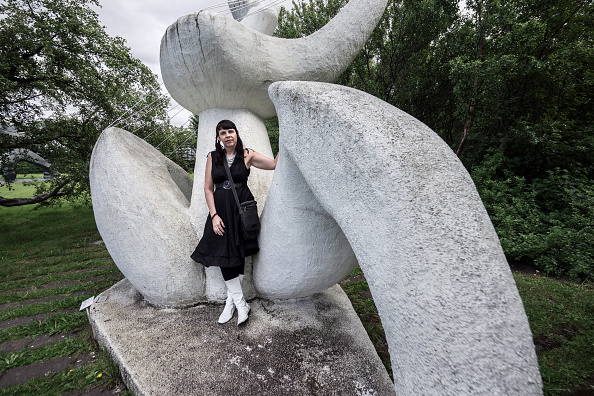Art World
Iceland’s Next Leader Could Be a ‘Poetician’ Dedicated to Using Creativity to Transform Government
See what the co-founder of the Pirate Party had to say at the Creative Time Summit.

See what the co-founder of the Pirate Party had to say at the Creative Time Summit.

Ben Davis

The Panama Papers leak has brought low the government of Iceland, forcing early elections this fall. According to opinion polls, the most likely next party to rule the small island nation is the anti-establishment Pirate Party. And the most likely leader of that party is Birgitta Jónsdóttir, a radical internet activist and self-described “poetician.”
To get a sense of where Jónsdóttir comes from, check out her talk at the 2014 Creative Time Summit on “Art in the Age of Surveillance.” There she describes herself as “an accidental parliamentarian,” adding, “I’m really just a poet… I see myself as an artist in parliament, a ‘poetician.’ One of the very few geeks there.”
Among other things, Jónsdóttir pioneered livestreaming in Iceland, and worked with WikiLeaks on Collateral Murder, the leaked footage from 2007 that showed a US Apache helicopter assassinating two Reuters staff members. “I think it is occasionally important for artists to go inside the system, and try to at least understand how it works from the inside, and to be engaged like that without becoming the embodiment of the power that is there,” she said at the Summit.
Following Iceland’s financial crisis, she became a prominent voice in the movement to rewrite Iceland’s constitution by direct democracy. From there, she co-founded the Pirate Party, becoming its first MP.
Her experience as an artist informs the Pirate Party’s platform of freedom-of-information as a human right. Jónsdóttir explained her strong take against copyright to Democracy Now!:
[C]opyright would be fine if it would be—had anything to do with the reality we live in today. Like, how come somebody has a copyright for 140 years on something? And it usually goes all back to the corporations and Hollywood and so forth and the big musical industry. It’s all industry. Art is not industry. You know, I am an artist. I am a poet. I’m an artist. My mother was a famous musician in Iceland. I hold copyright to her stuff. But I share it. There is a CC [Creative Commons mark] on everything I do. Anybody can remix or, you know, reuse, as long as they give me credit.
What could the rise of the Pirate Party mean for Iceland? It certainly reflects seething disaffection. Jónsdóttir has said that her first task would be to push through a new constitution. Speaking a few years ago at the NYU Hemispheric Institute in a panel organized by artist-activist pioneers the Yes Men, Jónsdóttir described herself as a “pragmatic anarchist.” She continued, “I don’t believe in this left or right politics. It’s an old-fashioned, out-of-date, dysfunctional way of doing politics.”
She also said that one of her goals was to “facilitate tools to give people the legal capacity to co-create society.” That’s a perspective reflected in the Pirate Party’s public statement issued when it first started to surge in the polls this year:
The Icelandic Pirate Party will not be able to solve all of the ingrown problems in Iceland but it will certainly be able to offer new hardware, complete with a new set of rules based on how we operate as a collective community.